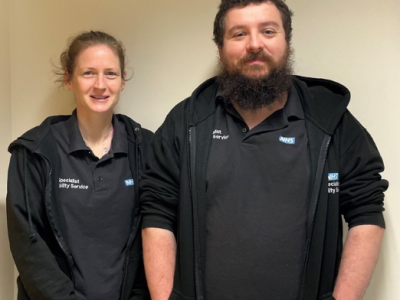
A client-centred, holistic approach to 24-hour postural management
presented by Bex Oakes and Richard Millar (photographed at work)
The presentation was centred around a case study of an individual with complex posture needs, and documented the journey both the therapist and individual went on to assess and improve all aspects of her postural management devices. This included her wheelchair, hospital bed, shower and toileting devices. The presentation reflected on how the postural devices could be altered to best support her postural needs and facilitate function, balancing the complex nature of the two. The presentation also provided an often-forgotten reflection on the individual’s experience of the changes made to her postural devices, and how the intervention improved her health and well-being from her own perspective.
Overall the presentation emphasised that having time to spend with an individual is critical to achieving quality and long-lasting outcomes, that addressing only one aspect of an individual’s 24-hour posture needs can result in ineffective treatment, and doesn’t allow for individualisation of treatment. The interventions that occurred in the case study happened over several visits and appointments, each geared towards addressing individual aspects of the client’s positioning. At every appointment and visit it was clear that time was spent understanding the individual’s postural, functional and personal needs for positioning. Time, although recognised as a crucial resource for treatment, is something that is more limited than we realise. This then made me reflect on something I often find myself discussing with colleagues in the NHS wheelchair services, that not enough time is allocated to the assessment process.
Another aspect emphasised in the presentation which played a critical role in the intervention process for the individual was interdisciplinary involvement. The therapist providing the advice and recommendations for 24-hour positioning was able to call on a number of other professionals to assist with manufacturing and provision of complex postural support devices, such as a custom commode and in-bed positioning devices. I am currently working in a commissioned wheelchair service and we only serve NHS clients. Because we are a private company we work largely in isolation from other professionals within the NHS, and it can be a challenge to communicate and work in conjunction with an interdisciplinary team. More experienced colleagues expressed that this is not universal, and is an area that can be addressed and improved within commissioned NHS services.
Working in a fast paced and high-pressure environment with substantial waiting lists can result in us losing focus on the fundamentals of assessment. Time is fundamental and is something that is easily forgotten. If one focuses only on tools, such as assessment forms and prescriptions, it’s possible to miss out on the nuanced details that only come out with time, as was demonstrated in the presentation. In my view this results in gaps in assessments and may result in inaccurate equipment being prescribed. It is possible then that less time in assessment could result in longer wait times, and negatively affect reported statistics. Inaccurate equipment provision can result in prolonged treatment times and re-referrals. It begs the question - is it worth looking at how more time spent in the initial assessment process can reduce the overtime an individual spends in the service. A possible area I could look into within my own service.
Ultimately, I felt this presentation was a call to reflect on my assessment practices and to be mindful of how I approach the individual’s needs; am I approaching 24-hour positioning in a holistic manner and taking that time to fully understand the individual’s needs? Or do I need to step back into my basic training and reset my professional habits? I hope the presentation encouraged others to do the same.






.jpg)



no comments
Add your comment...